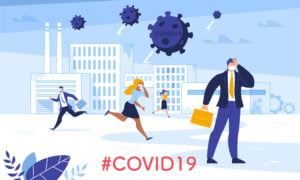(Image via Getty)
The rapid spread of the COVID-19 pandemic across the globe has impacted virtually every facet of life. The times we live in are now uncertain, the economy is going downhill, and nothing is normal anymore. If you remember what happened back in 2009, when thousands of lawyers lost their jobs thanks to the recession, you may be starting to have some flashbacks.
Major law firms have been attempting to manage their expenses by using the cost-cutting measures of salary cuts and benefits reductions, and some have even gone so far as to conduct furloughs and layoffs.
Just as we’ve done in the past when it comes to raises and bonuses, we are compiling a table of all the firms that have announced salary cuts, furloughs, and layoffs in these strange times. Today, we unveil that table so you can see exactly how the legal profession is dealing with the coronavirus crisis. We will be updating this table on a daily basis, sometimes multiple times, as more news is announced. If you see any information here that is incorrect or needs clarification, let us know.
Help us help you. Let us know what your firm is doing to survive during this unprecedented moment in time. The following firms have told employees they won’t cut salaries/conduct furloughs or have offered bonuses and special at-home tech budgets: Hueston Hennigan; Cahill Gordon.
As a little reminder, we love covering law firm news, but we need your help. As soon as you find out about salary cuts, furloughs, or layoffs at your firm, please email us (subject line: “[Firm Name] COVID Layoffs”). We always keep our sources on stories anonymous. There’s no need to send a memo (if one exists) using your firm email account; your personal email account is fine. If a memo has been circulated, please be sure to include it as proof; we like to post complete memos as a service to our readers. You can take a photo of the memo and attach as a picture if you are worried about metadata in a PDF or Word file.
| Firm | Measures Taken | Who Is Affected? |
| Robinson Brog | Layoffs | Staff (unclear how many employees impacted) |
| Goldberg Segalla | Layoffs | Staff (“large numbers” impacted) |
| Belkin Burden Goldman | Layoffs Salary Cuts |
Staff (about 2/3 of staff members laid off) Lawyers/Staff (salaries reportedly halved) |
| Womble Bond Dickinson | Layoffs Furloughs Salary Cuts |
Lawyers/Staff (10 percent pay reduction for anyone making over $100K; lower percentage reductions in the $50-100K range and sub-$50K range) |
| Reed Smith | Salary Cuts | Lawyers (partners slowing down cash distributions) |
| Marshall Dennehey | Benefit Cuts | Lawyers/Staff (suspending 4 percent employer 401(k) match until 2021) |
| Cadwalader | Salary Cuts | Lawyers/Staff (partners to forego distributions during “peak months”; 25 percent pay cuts for associates; 25 percent pay cuts for admin staff making more than $100K; 10 percent pay cuts for admin staff making less than $100K) |
| Rivkin Radler | Salary Cuts | Lawyers/Staff (partners did not receive compensation in March; 20 percent pay cuts for associates and staff) |
| Pryor Cashman | Furloughs | Lawyers (applies to “associates whose workflow has been interrupted by the COVID-19 crisis”) |
| Baker Donelson | Furloughs Salary Cuts |
Lawyers/Staff (partner draws and salary reduced; pay cuts across entire firm; some employees to be furloughed) |
| Allen & Overy (UK offices) | Salary Cuts | Lawyers/Staff (partners holding capital call and reducing profit distributions; associates and staff salaries frozen) |
| Cullen & Dykman | Furloughs Layoffs Salary Cuts |
Lawyers/Staff (at least 30 people laid off or furloughed; up to 20 percent pay cut for lawyers and staff) |
| Fross Zelnick | Salary Cuts | Lawyers/Staff (partners taking reduced draws; 15 percent pay cuts for associates and staff) |
| Curtis | Salary Cuts | Lawyers (25 percent pay cuts for associates) |
| Arent Fox | Salary Cuts | Lawyers/Staff (equity partner distributions reduced by 60 percent in March; 30 percent pay cuts for nonequity partnersl 30 percent pay cuts for counsel; 25 percent pay cuts for associates; 25 percent pay cuts for staff) |
| Loeb & Loeb | Salary Cuts | Lawyers/Staff (monthly draws reduced by 20 percent for capital partners; 15 percent pay cuts for income partners, senior counsel, of counsel, associates, senior staff; 10 percent pay cuts for paralegals and all other staff) |
 Staci Zaretsky is a senior editor at Above the Law, where she’s worked since 2011. She’d love to hear from you, so please feel free to email her with any tips, questions, comments, or critiques. You can follow her on Twitter or connect with her on LinkedIn.
Staci Zaretsky is a senior editor at Above the Law, where she’s worked since 2011. She’d love to hear from you, so please feel free to email her with any tips, questions, comments, or critiques. You can follow her on Twitter or connect with her on LinkedIn.







 Kathryn Rubino is a Senior Editor at Above the Law, and host of
Kathryn Rubino is a Senior Editor at Above the Law, and host of 








